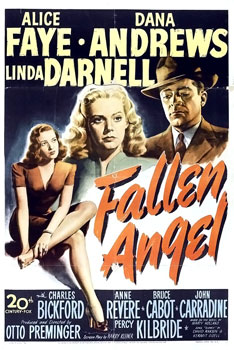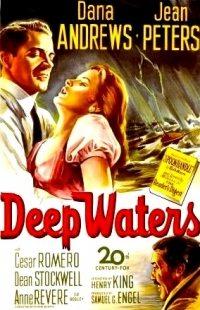Related Research Articles

Florence Lawrence was a Canadian-American stage performer and film actress. She is often referred to as the "first movie star", and was long thought to be the first film actor to be named publicly until evidence published in 2019 indicated that the first named film star was French actor Max Linder. At the height of her fame in the 1910s, she was known as the "Biograph Girl" for work as one of the leading ladies in silent films from the Biograph Company. She appeared in almost 300 films for various motion picture companies throughout her career.

Owen Moore was an Irish-born American actor, appearing in more than 279 movies spanning from 1908 to 1937.

Fallen Angel is a 1945 American film noir directed by Otto Preminger, with cinematography by Joseph LaShelle, who had also worked with Preminger on Laura a year before. The film features Alice Faye, Dana Andrews, Linda Darnell and Charles Bickford. Fallen Angel was Faye's last film as a major Hollywood star, and she did not appear in another film until State Fair (1962).

George Arliss was an English actor, author, playwright, and filmmaker who found success in the United States. He was the first British actor to win an Academy Award – which he won for his performance as Victorian-era British prime minister Benjamin Disraeli in Disraeli (1929) – as well as the earliest-born actor of any category to win the honour. He specialized in successful biopics, such as Disraeli, Voltaire (1933), and Cardinal Richelieu (1935), as well as light comedies, which included The Millionaire (1931) and A Successful Calamity (1932).

Resurrection is a 1909 American silent short film made by the Biograph Company. It is based on Leo Tolstoy's 1899 novel Resurrection. Adapted for the screen by Frank E. Woods, it was directed by D. W. Griffith and stars several pioneering legends of American cinema such as Arthur V. Johnson, Florence Lawrence, Marion Leonard, Owen Moore, Mack Sennett, and Linda Arvidson, who was Griffith's first wife.

Florence Auer was an American theater and motion picture actress whose career spanned more than five decades.

A Drunkard's Reformation is a 1909 American drama film directed by D. W. Griffith. Prints of the film survive in the film archive of the Library of Congress. The American Mutoscope and Biograph Company advertised the feature as "The most powerful temperance lecture ever depicted".

The Red Mill is a 1927 American silent comedy film directed by Roscoe Arbuckle that starred Marion Davies and was produced by King Vidor. Although Arbuckle was acquitted in the third trial for the death of Virginia Rappe, he could not obtain work in Hollywood under his own name, so he adopted the pseudonym William Goodrich for directing the comedy shorts he made under his contract with Educational Film Exchanges.

The Battle of the Sexes is a 1914 American silent drama film directed by D. W. Griffith for the Majestic Motion Picture Company. No complete print of the film is known to exist; however, a fragment has survived. Griffith remade the film as The Battle of the Sexes in 1928 as a comedy-drama and this latter version is available on DVD.

Helen's Babies is a 1924 silent comedy film directed by William A. Seiter, based on the 1876 novel Helen's Babies by John Habberton.
Biograph Girl was a phrase associated with two early-20th-century actresses, Florence Lawrence and Mary Pickford, who made black-and-white silent films with the Biograph Company. At that time, all studios refused to give actors on-screen film credit; they did not want them to gain public celebrity status and command higher salaries. This had already happened with stage actors, and the studios did not want to repeat the trend on film.

Deep Waters is a 1948 American drama film directed by Henry King and starring Dana Andrews, Jean Peters and Cesar Romero. The film is based on the 1946 novel Spoonhandle written by Ruth Moore and was nominated for a 1949 Oscar for Best Special Effects, but lost to Portrait of Jennie.
Velma Kelly is one of the main characters in the successful 1975 Broadway musical Chicago. Kelly is based on the character "Velma", who first appeared in the 1926 play, also called Chicago, who was in-turn inspired by the life of Belva Gaertner.
Chicago is a play written by Maurine Dallas Watkins. The play, while fiction, is a satire based on two unrelated 1924 court cases involving two women, Beulah Annan and Belva Gaertner, who were both suspected and later acquitted of murder, whom Watkins had covered for the Chicago Tribune as a reporter.

Let It Shine is a 2012 American musical television film that premiered on Disney Channel. It features an ensemble cast of Tyler James Williams, Coco Jones, Trevor Jackson and Brandon Mychal Smith. The film follows a shy, talented rapper and musician who pens romantic hip hop verses only to stand idly by as they're delivered to the girl of his dreams, Roxie Andrews, by his best friend, in a retelling of Edmond Rostand's 1897 play Cyrano de Bergerac. The film was directed by Paul Hoen and written by Eric Daniel and Don D. Scott. The Disney Channel Original Movie premiered on June 15, 2012 in the United States and Canada, and July 20, 2012 in the United Kingdom and Ireland.

Women Love Diamonds is a 1927 American black and white silent melodrama directed by Edmund Goulding and starring Pauline Starke, Owen Moore, and Lionel Barrymore.

Back Pay is an extant 1922 American silent drama film directed by Frank Borzage, produced by Cosmopolitan Productions and distributed through Paramount Pictures. It is based on a short story of the same name by Fannie Hurst, and stars Seena Owen.

The Parasite is a 1925 American silent society drama film produced by B. P. Schulberg, and distributed by Al Lichtman and Preferred Pictures. The film was based on the 1913 novel The Parasite by Helen Reimensnyder Martin. It starred Owen Moore, Madge Bellamy, and Mary Carr.

Out of a Clear Sky is a lost 1918 American silent romantic drama film starring Marguerite Clark and directed by Marshall Neilan. Based upon a novel by Maria Thompson Daviess, Famous Players–Lasky produced the film and Paramount Pictures distributed.
The Biggest Show on Earth is a surviving 1918 American silent drama film directed by Jerome Storm and written by Julien Josephson and Florence Vincent. The film stars Enid Bennett, Bliss Chevalier, Ethel Lynne, Melbourne MacDowell, Jack Nelson, and Earle Rodney. The film was released on April 28, 1918, by Paramount Pictures.
References
- ↑ Pictorial History of the Silent Film p.19 c.1953 by Daniel Blum ISBN 0-399-50667-5
- ↑ The Angel of the Studio at silentera.com
- ↑ The Moving Picture World. New York: The World Photographic Publishing Company. 1912.
 This article incorporates text from this source, which is in the public domain .
This article incorporates text from this source, which is in the public domain .